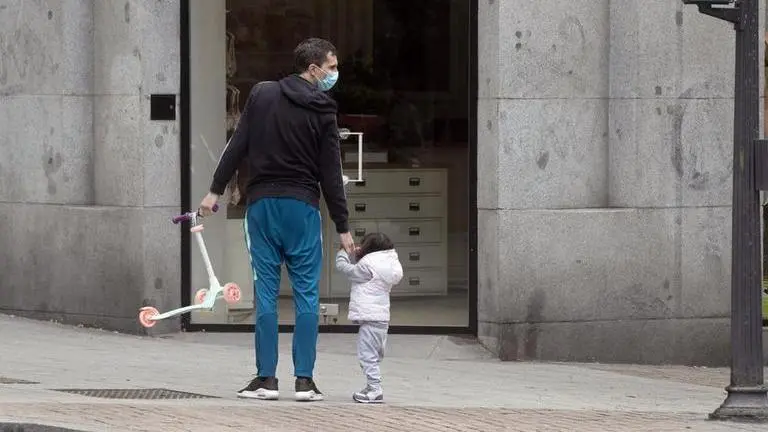Updated 27 April 2020 at 03:58 IST
Spain lets children play on streets for first time in six weeks as lockdown measures ease
Spain let children go outside and play Sunday for the first time in six weeks as European countries methodically worked to ease their lockdowns and reopen their economies.
- World News
- 4 min read

Spain has let children go outside and play for the first time in six weeks as European countries methodically worked to ease their lockdowns and reopen their economies, while in the United States, governors moved at differing speeds, some more aggressive, others more cautious.
Elsewhere around the world, China's state-run media said that hospitals in Wuhan, the original epicentre of the disaster, no longer have any COVID-19 patients, after a crisis in which the city recorded nearly 3,900 deaths. And British Prime Minister Boris Johnson planned to be back at his desk Monday at 10 Downing St. after a bout with the coronavirus that put him in intensive care.
While governors in states like hard-hit New York and Michigan are keeping stay-at-home restrictions in place until at least mid-May, their counterparts in places such as Georgia, Oklahoma and Alaska are allowing certain businesses to reopen. And churches in Montana began holding in-person services again Sunday.
The official death toll from the virus topped 200,000 worldwide, with over 2.9 million confirmed infections, according to a tally by Johns Hopkins University, though the real figures are believed to be much higher, in part because of inadequate testing and differences in counting the dead.
Advertisement
Italy, Britain, Spain and France accounted for more than 20,000 deaths each, the US for about 55,000.
Some encouraging signs were seen, as Italy recorded its lowest 24-hour number of deaths since mid-March, with 260, and New York state registered its fewest since late last month, with 367.
Advertisement
Seven weeks into Italy's strict lockdown, Premier Giuseppe Conte laid out a long-awaited timetable for getting back to normal, announcing that factories, construction sites and wholesale supply businesses can resume activity as soon as they put safety measures in place against the virus.
Conte also said that starting May 4, parks and gardens will reopen, funerals will be allowed, athletes can resume training, and people will be able to visit relatives living in the same region. If all goes well, stores and museums will open May 18, and restaurants, cafes and salons on June 1, he said.
But he warned that if people don't wear masks and obey other social-distancing rules, "the curve of contagion can rise again, it will go out of control, deaths will climb and we'll have irreparable damage” to the economy.
In Spain, where the crisis is also easing, the streets echoed again with children's shrieks of joy and the clatter of bicycles after youngsters under 14 were allowed out of their homes with one parent for up to an hour of play.
“This is wonderful! I can't believe it has been six weeks,” Susana Sabaté, a mother of 3-year-old twin boys, said in Barcelona. “My boys are very active. Today when they saw the front door and we gave them their scooters, they were thrilled.”
Spanish Prime Minister Pedro Sanchez will present a detailed plan Tuesday for the “de-escalation” of Spain's lockdown, saying: “Maximum caution will be our guideline for the rollback.” His French counterpart likewise said he will unveil a “national deconfinement strategy” on the same day.
In the US, where President Donald Trump has repeatedly pushed to reopen the country for business and a split has opened among the states along often partisan lines, Oklahoma Gov. Kevin Stitt, a Republican, told Fox News that with hospitalizations dropping in his state, he will reopen churches and restaurant dining on Friday, with social-distancing guidelines in place.
“We believe it's the time to have a measured reopening,” he said.
But Michigan Gov. Gretchen Whitmer, a Democrat, told ABC that her state is not ready and needs more robust testing, community tracing and a plan for isolating people who get sick with COVID-19.
“We've got to be nimble and we have to follow the science and be really smart about how we reengage," she said, “because no one — no one, even if you're a protester or you're the sitting governor or you're on another side of the issue — we know that no one wants a second wave.”
She added: "It would be devastating for the health of our people and for our economy.”
Other European nations are further along in easing lockdowns.
Germany allowed nonessential shops and other facilities to open last week, and Denmark has reopened schools for children up to fifth grade.
In China, Wuhan said all major construction projects have resumed as authorities push to restart factory production and other economic activity after a 2 1/2-month lockdown.
Published By : Associated Press Television News
Published On: 27 April 2020 at 03:58 IST
